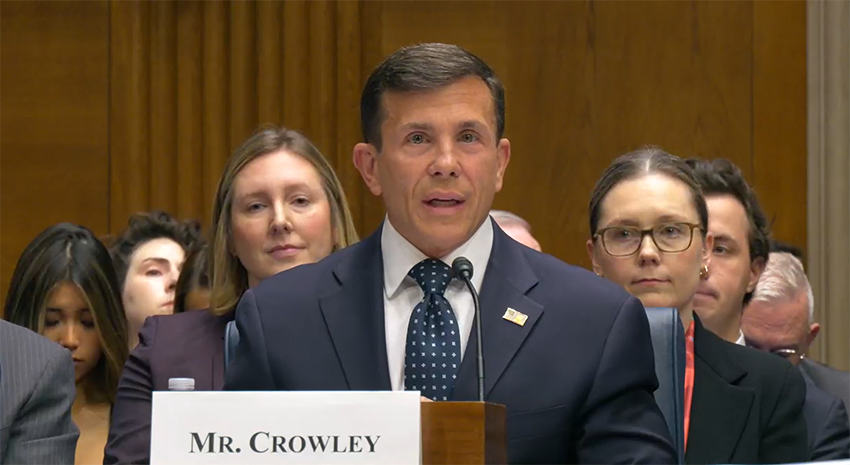Maintaining America’s biotechnology leadership requires Food and Drug Administration (FDA) modernization as well as Congressional action to reauthorize a program supporting rare disease research and incentivize domestic manufacturing, BIO President & CEO John F. Crowley told a receptive Senate hearing.
“The United States has led the world in biotechnology for decades — not by chance, but by design,” Crowley’ testified Oct. 29 in the Senate Health, Education, Labor and Pensions (HELP) Committee hearing on the future of biotech. “A science-driven, well-resourced, and globally respected biotechnology ecosystem is essential to not only provide Americans health and hope but also to provide national security.”
Crowley explained the importance of supporting biotech before providing detailed recommendations for modernizing the FDA and enhancing the domestic drug supply chain.
He also urged reauthorization of the Pediatric Priority Review Voucher (PPRV) program, which encourages rare disease research. As Crowley testified, rare diseases have long been important to him. He explained that his biotech career began when he founded a company with the goal of saving his own children, who have a rare condition called Pompe disease.
“Thank you for sharing your family’s personal experience,” Sen. Patty Murray (D-WA) said. “I think that’s a story that many of us need to remember, that these investments we make pay off for individuals.”
Crowley’s testimony was well received by Senators from both sides of the aisle.
“This bipartisan support is essential for biotech,” said Aiken Hackett, BIO Senior Vice President, Federal Government Relations. “In a time when biopharma policies can be polarizing, the Senate HELP Committee certainly came together to recognize the importance of the biotech ecosystem—for the reasons John repeatedly lays out: the public health, our economy, and our national security.”
Why biotech matters
Crowley noted the challenges and importance of the biotech industry.
“Biotech R&D faces a failure rate exceeding 90%, takes 10–15 years, and can cost more than $2.6 billion,” said his written testimony. “Investors will not fund this work unless developers can rely on a predictable environment that includes strong intellectual property (IP) protections, clear regulatory pathways and access to capital.”
Despite these challenges, Crowley said, the U.S. is the world leader in biotech innovation that provides new treatments. Maintaining that leadership is “a national security imperative,” particularly given China’s efforts to dominate global health technology.
“The bipartisan National Security Commission on Emerging Biotechnology (NSCEB) has warned that China is rapidly closing the innovation gap and may soon overtake the United States,” Crowley testified. “As of March 2025, China accounts for 30% of global clinical trial starts, nearly matching the U.S. share of 35%. In 2024, China’s innovative drug assets represented 32% of the global biopharma pipeline, up from just 4% a decade earlier.”
Beijing’s approach to biotech expansion is strategic and includes efforts to manipulate the pharmaceutical supply chain, control data flows and appropriate intellectual property.
“These actions threaten not only U.S. competitiveness, but also the health security of our allies and trading partners,” Crowley testified. “To confront these threats and secure America’s biotech future, we must take proactive, strategic action.”
FDA modernization
As Crowley explained, American biotech’s success has much to do with the FDA, which sets the gold standard as a regulatory agency for drug development. Given the agency’s importance, modernizing the FDA would go a long way to supporting American biotech, he said. Crowley laid out several recommendations to achieve this, broken down into three main categories:
Reduce the Time, Cost and Complexity of Early Drug Development:
- Reduce administrative burdens in clinical trials.
- Explore expansion of single Institutional Review Boards (sIRBs).
- Reduce animal testing by enabling New Approach Methods (NAMs);
- Clarify toxicology data requirements minimally necessary to initiate clinical testing.
- Further Quality Risk Management (QRM) in manufacturing to accelerate the start of Investigational New Drug (IND) applications.
- Ensure rapid/frequent communications with sponsors throughout drug development.
Strengthen FDA’s Regulatory Review: Predictability and Efficiency:
- Improve first-cycle review through consistent application of the PDUFA “Enhanced Review Program.”
- Streamline inspections by expanding Remote Interactive Evaluations and leveraging Drug Master Files and reliance on trusted foreign regulators.
- Advance innovative trial designs.
- Accelerate biomarker qualification with clear evidentiary standards.
- Expand the Platform Technology Designation (PTD).
- Applying expedited development tools and flexible frameworks for chronic diseases.
- Support efforts to fulfill PDUFA meeting management goals.
Support New Models for External Engagement and Transparency to Accelerate Innovation:
- Evolve the use of Advisory Committees to focus on questions of science rather than questions about the regulations.
- Establish common platforms for shared learning across the innovation ecosystem.
- Fill FDA positions focused on consistently advancing the FDA vision for regulatory science.
How Congress can support US manufacturing
Biotech companies are eager to take part in the Trump Administration’s drive to increase pharmaceutical R&D and manufacturing in the U.S., and close to half a trillion dollars has been committed to this effort since the beginning of this year, according to Crowley. But smaller biotechs cannot make the switch to domestic manufacturing until there is sufficient contract manufacturing capacity in the U.S., he added.
“As service providers, contract manufacturers are not well positioned to quickly scale up without support. Infrastructure and supply chain investment, financial incentives, and workforce development programs are critical areas where government can assist,”
Crowley described a series of steps that Congress can take.
“Targeted incentives—tax, capital, and IP benefits—will help small and mid-sized firms, and their contract manufacturers, build the infrastructure needed to bring production back to the U.S.”
His specific recommendations included:
- Assist contract manufacturing facilities with tax incentives for low volume contracts; incentives for facility and equipment buildouts; government grants and credit for biotech manufacturing projects; and incentives for advanced systems and pilot-scale facilities and integrated end-to-end facilities.
- Offer biotech companies incentives for transferring technology to the U.S.
- The combined ecosystem benefits from support for regional biotech clusters through incentives for shared infrastructure, workforce development, and expertise; support in accessing land and utilities in development zones; improvements in infrastructure essential to biotech manufacturing; and streamlined environmental reviews for biotech construction while upholding safety standards.
- Workforce development through measures to standardize biomanufacturing education; grants, apprenticeships, and institutional training support to fund workforce development; and funding for programs to upskill science professionals in biomanufacturing.
- Federal oversight and coordination to unify biomanufacturing efforts across federal agencies.
The Rare Pediatric Disease Priority Review Voucher (PPRV)
Congress can do much to help the biotech industry and patients through urgent reauthorization of the PPRV, Crowley said.
The program incentivizes development of drugs for rare diseases impacting children by providing a voucher to developers of approved drugs. The voucher can be used to gain faster FDA review of a future drug candidate or can be sold to obtain funding for R&D or other purposes.
“The (PPRV) serves as a powerful incentive to stimulate the development of therapies for diseases that are not economically viable to pursue—and does so at no direct cost to taxpayers,” Crowley said. He added that 53 of the vouchers have been awarded across 39 rare pediatric diseases. Before the PPRV program, only three of those 39 diseases had an FDA-approved treatment, he said.
Since the PPRV was created in 2012, the program has been reauthorized by Congress every four years with bipartisan support. Despite continued bipartisan support, the program lapsed in 2024 and it needs reauthorization “to provide the most vulnerable patients the treatment and hope they so desperately need as well as protect and advance American biotech innovation,” Crowley said.
Senators back biotech
HELP Committee Chair Bill Cassidy, MD (R-LA) highlighted the importance of supporting biotech at the beginning of the hearing.
“The United States leads the world in lifesaving medical discoveries, accounting for 40 percent of the world’s biotech-related patents for drugs. Backed by the FDA’s gold standard review, we produce twice as many novel chemical or biological products as European countries,” according to Sen. Cassidy’s prepared remarks.
“But, we cannot rest on our laurels. We must work to maintain that edge. Regulatory uncertainty and outdated frameworks stifled progress and pushed developers overseas—recently to Communist China,” he continued.
Even Ranking Member Bernie Sanders (I-VT), a frequent critic of the drug industry, acknowledged the importance of supporting biotechnology.
“Over the last number of years, there have been a number of innovations that have saved lives, eased pain. And we thank all of the scientists, the companies that are responsible for that, scientists who work at our nation’s universities,” said Sen. Sanders’ prepared opening statement. “The NIH and pharmaceutical companies deserve our gratitude and respect for the incredible work they have done to discover, as the Chairman mentioned, new treatments and cures. And we must continue to support those efforts.”
Sen. Cassidy described a vision for how officials can support biotech.
“We need structural reform to give innovators stability and confidence that they can create in America without hardship,” he said. “This includes eliminating unnecessary barriers in the FDA drug approval process, while ensuring the gold standard of review is maintained.”




